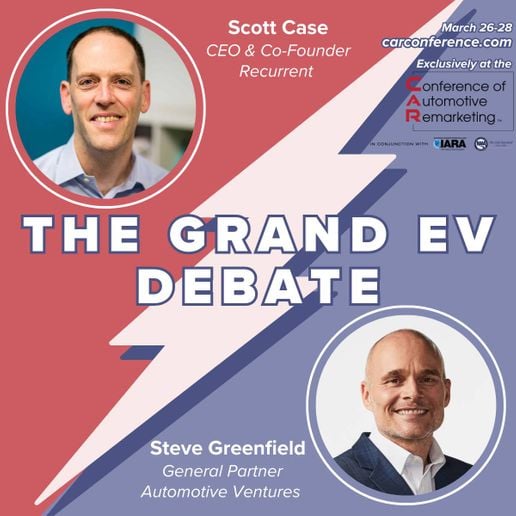
During their debate, Greenfield and Case will cover the challenges of charging network access, high costs and price changes, dealer pushback, cold weather dramas, and whether 2030 is a realistic date for current EV sales and adoption targets.
Photos/Graphic: Speakers / Bobit
2023 and 2024 have produced a spate of inconvenient and negative headlines on the push for fleet and retail vehicle electrification, raising doubts about their timing and certainty.
In the past year, Hertz started downsizing its electric fleet by 20,000 vehicles; EV sales have slowed as retail buyers resist them; more experts and business leaders are expressing concerns about EV power grid sources, mineral supplies, charging access, costs, and EV range; dealerships are pushing back on excess EVs on their lots; and manufacturers are reporting major EV-related financial losses and production cutbacks.
Add it all up, and electric vehicles are now part of a debate, not a done deal.
Two established automotive experts on EVs will present differing views on the next phase for electric vehicles as the industry clears the start-up honeymoon period. Scott Case, the co-founder and CEO of Recurrent, and Steve Greenfield, general partner of Automotive Ventures, will debate EVs live on stage on March 28 for the closing keynote presentation at the Conference of Automotive Remarketing.
The candidate-style faceoff will be moderated by official CAR emcee Charlie Vogelheim.
“I don’t think consumer demand for EVs is going to be there in the mid-term,” Greenfield said. “I think we’re going to see a number of consulting firms start to downgrade their 10-year targets for EV penetration.”
During a presentation at the International Automotive Remarketers Alliance annual Summer Roundtable on Aug. 24, Greenfield spelled out the conflicting signals and mixed outcomes in the years ahead as America pursues vehicle electrification. He described the core problem and challenge with this quote from a Wall Street Journal editorial: “Policy makers have adopted a view that EVs are the future but haven’t invented the economics to go with it. As a result, the automotive market will see an oversupply of EVs for a few years.
“The big unknown is if (President) Trump gets back in the White House and as a result, if the Inflation Reduction Act starts to get dismantled,” Greenfield told Automotive Fleet. “Without consumer-facing incentives, we’re going to see what actual consumer demand for EVs is, and I don’t think it’s going to be pretty.”
Case points out that in every consumer survey on EV buying over the last 12 months between 25% and 48% of respondents indicated that they’ll buy an EV soon, despite all the well-documented headwinds.
“That puts the US on track to go way past the ‘tipping point’ within the next two years that countries like Norway, China, Germany, and the UK have passed already, where the transition accelerates in a classic S-Curve of adoption,” Case said.
Dealers and OEMs are misinterpreting market demand signals, whether on purpose or not, leaving a big opportunity for market leaders who can figure out how to design, build, market, sell and resell EVs effectively, Case said. “Those that zig when most everyone is zagging have a chance to wildly upend market share splits that have calcified over the decades.”
During their debate, Greenfield and Case will cover the challenges of charging network access, high costs and price changes, dealer pushback, cold weather dramas, and whether 2030 is a realistic date for current EV sales and adoption targets.
The Conference of Automotive Remarketing will be held March 26-28 at the Hilton Phoenix at the Peak. CAR registration details here.
Originally posted on Automotive Fleet
